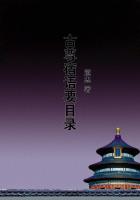I have rejected Mr Harris's view that Shakespear died broken-hearted of "the pangs of love despised." I have given my reasons for believing that Shakespear died game, and indeed in a state of levity which would have been considered unbecoming in a bishop. But Mr Harris's evidence does prove that Shakespear had a grievance and a very serious one. He might have been jilted by ten dark ladies and been none the worse for it; but his treatment by the British Public was another matter. The idolatry which exasperated Ben Jonson was by no means a popular movement; and, like all such idolatries, it was excited by the magic of Shakespear's art rather than by his views.
He was launched on his career as a successful playwright by the Henry VI trilogy, a work of no originality, depth, or subtlety except the originality, depth, and subtlety of the feelings and fancies of the common people. But Shakespear was not satisfied with this. What is the use of being Shakespear if you are not allowed to express any notions but those of Autolycus? Shakespear did not see the world as Autolycus did: he saw it, if not exactly as Ibsen did (for it was not quite the same world), at least with much of Ibsen's power of penetrating its illusions and idolatries, and with all Swift's horror of its cruelty and uncleanliness.
Now it happens to some men with these powers that they are forced to impose their fullest exercise on the world because they cannot produce popular work. Take Wagner and Ibsen for instance! Their earlier works are no doubt much cheaper than their later ones; still, they were not popular when they were written. The alternative of doing popular work was never really open to them: had they stooped they would have picked up less than they snatched from above the people's heads. But Handel and Shakespear were not held to their best in this way. They could turn out anything they were asked for, and even heap up the measure. They reviled the British Public, and never forgave it for ignoring their best work and admiring their splendid commonplaces; but they produced the commonplaces all the same, and made them sound magnificent by mere brute faculty for their art. When Shakespear was forced to write popular plays to save his theatre from ruin, he did it mutinously, calling the plays "As _You_ Like It," and "Much Ado About Nothing." All the same, he did it so well that to this day these two genial vulgarities are the main Shakespearian stock-in-trade of our theatres. Later on Burbage's power and popularity as an actor enabled Shakespear to free himself from the tyranny of the box office, and to express himself more freely in plays consisting largely of monologue to be spoken by a great actor from whom the public would stand a good deal. The history of Shakespear's tragedies has thus been the history of a long line of famous actors, from Burbage and Betterton to Forbes Robertson; and the man of whom we are told that "when he would have said that Richard died, and cried A horse! A horse! he Burbage cried" was the father of nine generations ofShakespearian playgoers, all speaking of Garrick's Richard, and Kean's Othello, and Irving's Shylock, and Forbes Robertson's Hamlet without knowing or caring how much these had to do with Shakespear's Richard and Othello and so forth. And the plays which were written without great and predominant parts, such as Troilus and Cressida, All's Well That Ends Well, and Measure for Measure, have dropped on our stage as dead as the second part of Goethe's Faust or Ibsen's Emperor or Galilean.
Here, then, Shakespear had a real grievance; and though it is a sentimental exaggeration to describe him as a broken-hearted man in the face of the passages of reckless jollity and serenely happy poetry in his latest plays, yet the discovery that his most serious work could reach success only when carried on the back of a very fascinating actor who was enormously overcharging his part, and that the serious plays which did not contain parts big enough to hold the overcharge were left on the shelf, amply accounts for the evident fact that Shakespear did not end his life in a glow of enthusiastic satisfaction with mankind and with the theatre, which is all that Mr Harris can allege in support of his broken-heart theory. But even if Shakespear had had no failures, it was not possible for a man of his powers to observe the political and moral conduct of his contemporaries without perceiving that they were incapable of dealing with the problems raised by their own civilization, and that their attempts to carry out the codes of law and to practise the religions offered to them by great prophets and law-givers were and still are so foolish that we now call for The Superman, virtually a new species, to rescue the world from mismanagement. This is the real sorrow of great men; and in the face of it the notion that when a great man speaks bitterly or looks melancholy he must be troubled by a disappointment in love seems to me sentimental trifling.
If I have carried the reader with me thus far, he will find that trivial as this little play of mine is, its sketch of Shakespear is more complete than its levity suggests. Alas! its appeal for a National Theatre as a monument to Shakespear failed to touch the very stupid people who cannot see that a National Theatre is worth having for the sake of the National Soul. I had unfortunately represented Shakespear as treasuring and using (as I domyself) the jewels of unconsciously musical speech which common people utter and throw away every day; and this was taken as a disparagement of Shakespear's "originality." Why was I born with such contemporaries? Why is Shakespear made ridiculous by such a posterity?
_The Dark Lady of The Sonnets was first performed at the Haymarket Theatre, on the afternoon of Thursday, the 24th November 1910, by Mona Limerick as the Dark Lady, Suzanne Sheldon as Queen Elizabeth, Granville Barker as Shakespear, and Hugh Tabberer as the Warder.















